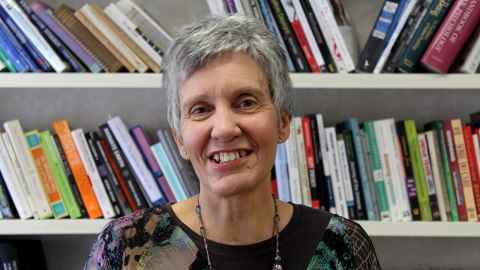Take 10 with... Niki Harre
Professor Niki Harre, from the School of Psychology, gives us 10 minutes of her time to discuss her research into shared human values and the potential for change.

1. Describe your research topic to us in 10 words or less.
Intrinsic human values and activism for the common good.
2. Now explain it in everyday terms!
I am interested in the core human values that underlie all social groups. In particular I look at what happens when people share their deepest values and attempt to engage in values-based practice. We are facing serious threats to the natural environment and so it is crucial we figure out ways of working together to change our practices. Identifying and coming back to our shared values is an important place to start. This can generate trust and a sense of collective hope.
3. Describe some of your day-to-day research activities.
Most recently my graduate students and I ran a values-based practice course with people from the community. We explored what values-based practice looks like at the personal and organisational level. I do a lot of talks and workshops, and liaise with people from many different sectors of society. I also write about these issues and the role universities have in keeping core human values in play.
4. What do you enjoy most about your research?
I love writing – I am basically an introvert! It is also very energising to work with people in the community who are making real change.
5. Tell us something that has surprised you in the course of your research.
I am always amazed at just how many people are concerned about the same things as me! How can we protect this incredible planet of ours and ensure that people also thrive? How do we wrench ourselves away from material goods and institutions that strive for prestige, and toward the basics of wellbeing?
6. How have you approached any challenges you’ve faced in your research?
Each challenge is unique. I am pretty well organised and very persistent. I tend to just keep going. Sometimes I finish things that I probably should drop. I almost always have graduate students involved in projects and so giving up usually isn’t an option. As my work is in the community, even if the research doesn’t turn out well, it has usually brought people together to talk about important issues. So that is a major consolation prize.
7. What questions have emerged as a result?
When you see a project through to the end, you can move on. The sad truth is a lot of projects turn out to be not as interesting as you hoped. Research is a risk or else it wouldn’t be research. The pressure to publish everything you do is not very helpful as it means a lot of rather ‘small’ studies are in print – including some of mine!
8. What kind of impact do you hope your research will have?
I think we need to develop ways of talking with each other and figuring out our problems collectively. I hope my work will contribute to more connected communities. If we feel responsible for each other, we will be much better placed to deal with the challenges of climate change and other environmental problems.
9. If you collaborate across the faculty or University, or even outside the University, who do you work with and how does it benefit your research?
I collaborate with anyone who is interested in sustainability and wellbeing and so have contacts in every faculty and many service divisions as well. I also work closely with schools, the Auckland Council sustainable schools team, youth sustainability groups and the Sustainable Business Network on projects to facilitate sustainable action. We are all in the same game of trying to improve the social structures we work within.
10. What one piece of advice would you give your younger, less experienced research self?
Try not to get distracted by topics that might be ‘good for your career’ or that are ‘interesting’ but not very meaningful. To me, the university exists to serve our communities and that means doing research that makes a genuine contribution. This doesn’t mean it has to be of immediate practical value, but it does have to feel like it speaks to something people care about – something that can enrich our lives together.